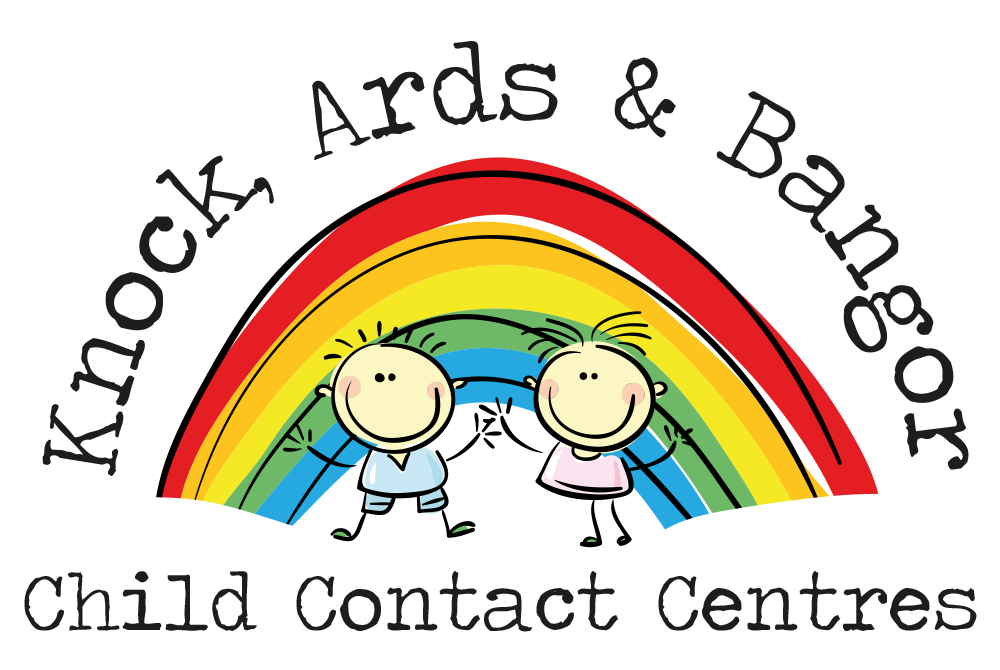Knock / Newtownards / Bangor Child Contact Centres provides a neutral meeting place where children of separated families can enjoy contact with one or both parents, and sometimes other family members, in a comfortable and safe environment when there is no viable alternative.
The centre is available to parents and children on the following terms, which are intended to ensure that contact, is a safe and positive experience.
In applying to use the centre I understand that:
- The centre does not play a role in the court process. The Contact Centre is independent of the Court system. As such, Centres are not obliged to, and will not accept referrals, whether ordered or not, where such referrals do not meet the regulations of the centre, either by unwillingness of potential users to comply with the rules of the centre, or where users fail to meet our risk assessment threshold for using the centre.
- Use of the Centre depends on successful completion of the referral process and pre contact assessment as well as compliance with the rules and operating guidelines of the centre, of which the centre Co-ordinator will be the sole judge.
- The Centre does not provide written reports other than to provide details of dates and times of attendance. Nor will the centre provide any emails / texts, or other correspondences for submission to the court or to any other person, except in relation to child protection issues or criminal law matters which arise during contact visits. In this instance the parents will be fully informed of the centres intention to submit a written report.
- The Centre can, if requested, report dates and times of attendance & who attended for contact. A period of 14 days’ notice is required for a dates and times report.
- If a CCO is allocated to my case by the court, the CCO may at times contact the centre for an update to clarify if there have been any issues of concern. In such cases the Coordinator will communicate this update verbally. If issues are present during contact, a CCO or other Court-appointed Social Worker can carry out an observed visit in the Centre and report back to the court. On this occasion the centre will be used as a hosting venue only and will play no part in the CCO’s or other Social Worker’s assessment.
- The Centre operates a zero tolerance policy regards inappropriate behaviour / language. Persons using the Centre are asked not to cause any disturbance or upset to their own children or others using the centre. This includes the use of aggressive / intimidating behaviours or inappropriate language. If service users behave in a way considered by the Centre Coordinator to be unacceptable they may be asked to leave and their use of the Centre will be reviewed. Use of the centre may be suspended or revoked, at the Co-ordinator’s discretion.
- Adults should be on time at the beginning and end of each session to avoid upsetting the children and where required, to comply with any order that is in place. If staggered times of arrival/departure are agreed, they must be adhered to.
- If anyone is unable to attend, they should contact the Coordinator as soon as possible and if appropriate, also inform all parties e.g. solicitor and/or social worker.
- Child Contact Centres provide Supported contact as distinct from Supervised By distinction, supported contact is suitable where no potential significant risk exists to the child, other users of the centre or staff/volunteers. Staff and volunteers are available for assistance, not supervision. No individual or close observation, monitoring or evaluation of contact or conversations takes place, other than to ensure that the environment is safe and suitable for the child.
- The welfare of the children is paramount and as a result there may be times when the Centre Co-ordinator deems that contact cannot take place if the child is too upset, even if a court order permitting contact exists.
- The Centre under no circumstances permits verbal or audio recordings to be made of staff or service users in line with our use of media policy. If recordings are made, this will result in immediate suspension from the use of the Centre.
- If you change contact details i.e. address, telephone number, please ensure that we are kept fully informed. This includes informing the centre in a timely fashion of any changes to contact agreements following court reviews.
- It has been explained to me that my contact with the Centre is confidential unless issues arise relating to child protection or criminal law. In such instances, by law this cannot remain confidential.
- Contact Centre Staff and volunteers are not there to offer any advice regarding legal, financial, child care or counselling matters, but we can signpost where appropriate.
- The use of the Contact Centre is not a long term solution to problems with contact and use of the Contact Centre will be reviewed after 6-8 sessions and thereafter as necessary. Please note that centres will not accept final orders unless specifically agreed in advance with the individual centre and where a maximum time limit is provided. Individual Centres can reject final orders where these orders have no set time limits for the duration of the contact.
- If anyone arrives for contact at the Centre under the influence of alcohol or drugs they will be asked to leave and that contact cannot continue. NO alcohol or drugs are permitted on the premises.
- Arrangements for bringing the children to and from the centre are the responsibility of the adult they live with. Under no circumstances will the Centre accept unaccompanied children for contact.
- While at the centre the children must be under the supervision and control of a parent or other agreed person at all times to ensure their safety.
- The Centre is a no smoking environment.
